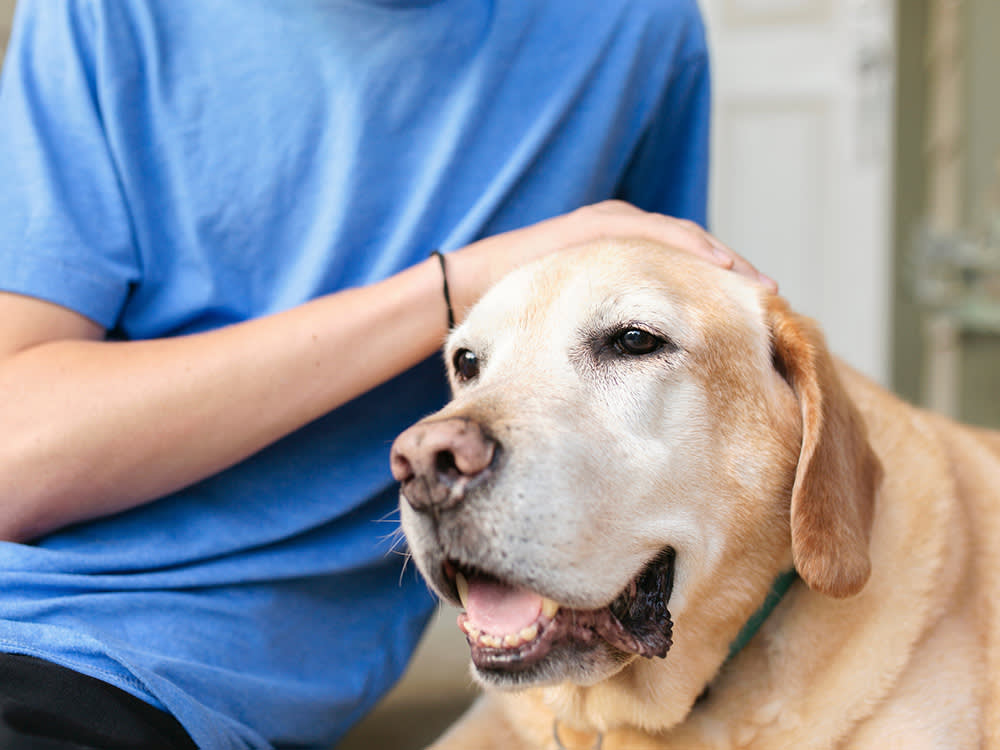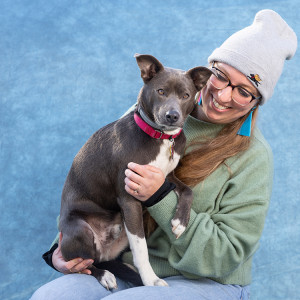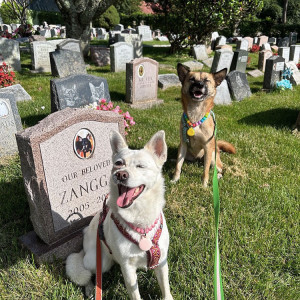Anticipatory Grief for an Aging—or Even Young—Pet Is a Very Real Thing
Are you already feeling sad about losing your pet even though they're still alive?

Share Article
The feeling can come out of nowhere. Maybe you’re walking your dog and notice how their pace has slowed over time. Or perhaps you’re flipping through photo albums and realize just how many years they’ve been by your side. Whatever the reason, the knot in your throat is undeniable. Suddenly, you’re thinking about a future without them in it — about having to pack up their collar, their tag, and their favorite toys to store somewhere special. The scenario might be in your head, but the sadness is real. This is called “anticipatory grief.”
Anticipatory grief might feel strange or even silly, but the pain is perfectly normal. It doesn’t matter if your pet is old or young, sick or healthy. According to veterinary social worker Haley Engelman, a group facilitator for Pet Loss Communityopens in a new tab, anyone can experience anticipatory grief at any time. That said, it’s most common among those whose pets are getting older or whose health is in decline. Whether you’re going through it yourself or supporting a loved one, empathy will be key.
Those who experience anticipatory grief are in a uniquely difficult position, Engelman says. They’ll feel all of the same things as anyone who is grieving a deceased petopens in a new tab, plus “the stress and anxiety that comes with the ‘what ifs’ — the unknown of the future, and the unique dynamic of grief when our pet is still here with us.”
Let your grief come.
While everybody experiences anticipatory grief differently, Engelman has observed a few common themes. Beyond feelings typically associated with mourning, such as sadness, numbness, guilt, and anger, she notes that anticipatory grievers can also experience anxiety, fear, and worry. You might feel afraid to leave your pet aloneopens in a new tab, catch yourself overthinking about the future, or struggle to concentrate when they’re not by your side.
One of the most important steps to processing these emotions, Engelman says, is to give yourself permission to grieve in the first place.
“Some people feel silly for grieving when their pet is still here,” Engelman says, but “there truly is no avoiding our feelings. We have to go through the pain to get to a point where our grief is manageable in our day-to-day lives.”
As for how one actually processes anticipatory grief? Engelman suggests letting your feelings lead the way: If you want to cry, let yourself cry. If you’re feeling angry, don’t question it. Feel and observe all of the emotions that might arise without judgment. And as obvious as it might seem, find ways to spend time with your pet while they’re still alive — all the while staying grounded in the “here and now.” That way you won’t regret having lost that time with them later on.
Find a partner in your pain.
You don’t have to go it alone, either. Just like with any loss, Engelman suggests finding a support system with whom you can safely discuss your feelings. This could include friends and family, a grief support groupopens in a new tab, or a mental health professional.
For those considering professional assistance, Engelman doesn’t believe there’s any specific time when it’s best to reach out. Some people do so as they prepare for the loss, and some seek help immediately after the death. Others might wait until they’ve tried everything else.
“I think it is up to the individual when they feel like it’s the right time to find that extra support,” Engelman says. “I would say it’s never too early or too soon to seek out a mental health professional and add another person who is in your corner.”
If you’re supporting a grieving friend, listen.
Pet parent or not, we should all offer our unconditional support to those we know who are grieving. In many cases, this mostly comes down to being patient and understanding.
“Let people talk about their grief, even if they talk about the same thing 100 times or for years,” Engelman says. “It will tremendously help them sort through all of the feelings of anticipatory grief and the grief that will eventually follow.”
It’s hard to overstate how important an empathetic ear can be. Research has shown opens in a new tab that grievers found greater satisfactionopens in a new tab in the support they received from animals than from their human support systems. Unlike people, who eventually got tired of listening to the same stories and complaints over and over again, the animals never did. So, if your friend is missing their pet (or even thinking about missing them), remember they are also thinking about missing a key component of the network that boosts their spirits daily. Try to do your best to fill that role as you bolster them in their time of need.
“There is no timeline on grief, and everyone grieves differently,” Engelman says. “So, just be there for someone. It’s the most important thing we can do.” After all, few things feel more heartbreaking than the isolation of mourning alone.
References
Cacciatore, Joanne, et al. “What Is Good Grief Support? Exploring the Actors and Actions in Social Support after Traumatic Grief.” PLOS ONE, vol. 16, no. 5, 2021, www.ncbi.nlm.nih.gov/pmc/articles/PMC8158955/, https://doi.org/10.1371/journal.pone.0252324opens in a new tab.

Laura Bradley
Laura is a New York-based experienced writer and mom of two rescue pups. When she is not writing or walking the pooches, you will probably find her in the community garden.
Related articles
![Woman comforting her friend who has lost a pet.]() opens in a new tab
opens in a new tab10 Ways to Support a Friend Who Is Grieving a Pet
Not everyone understands how hard it is to lose a pet. You can be the person who does.
![Three woman hold and support each other.]() opens in a new tab
opens in a new tabSupport Groups for Grieving Pet Parents Are on the Rise
The best medicine when you’re experiencing loss? Finding others who get it.
![Woman hugging her dog while sitting on the couch.]() opens in a new tab
opens in a new tab“Griffin’s Heart” Should Be Your Go-To Grief Guide
A pet-loss workbook sounds corny, but this gentle, realistic book lets you go at your own pace to heal.
![A dog resting its face on a wooden table.]() opens in a new tab
opens in a new tabDo Dogs Grieve When Other Dogs Die?
A study confirms our pets can have heartbreaking reactions to the loss of a canine companion.
![A woman wearing a gray beanie hat and a light green sweater holding her mixed breed ashy grey dog in front of a blue backdrop]() opens in a new tab
opens in a new tabE.B. Bartels Wrote the Book on Pet Grief
The author’s new book explores different cultural rituals for memorializing a pet — from tattoos to taxidermy.
![two dogs by a grave in a pet cemetery]() opens in a new tab
opens in a new tab5 of the Most Beautiful Places in the US to Lay Your Pet to Rest
These pet cemeteries are giving animals the memorials they deserve.








